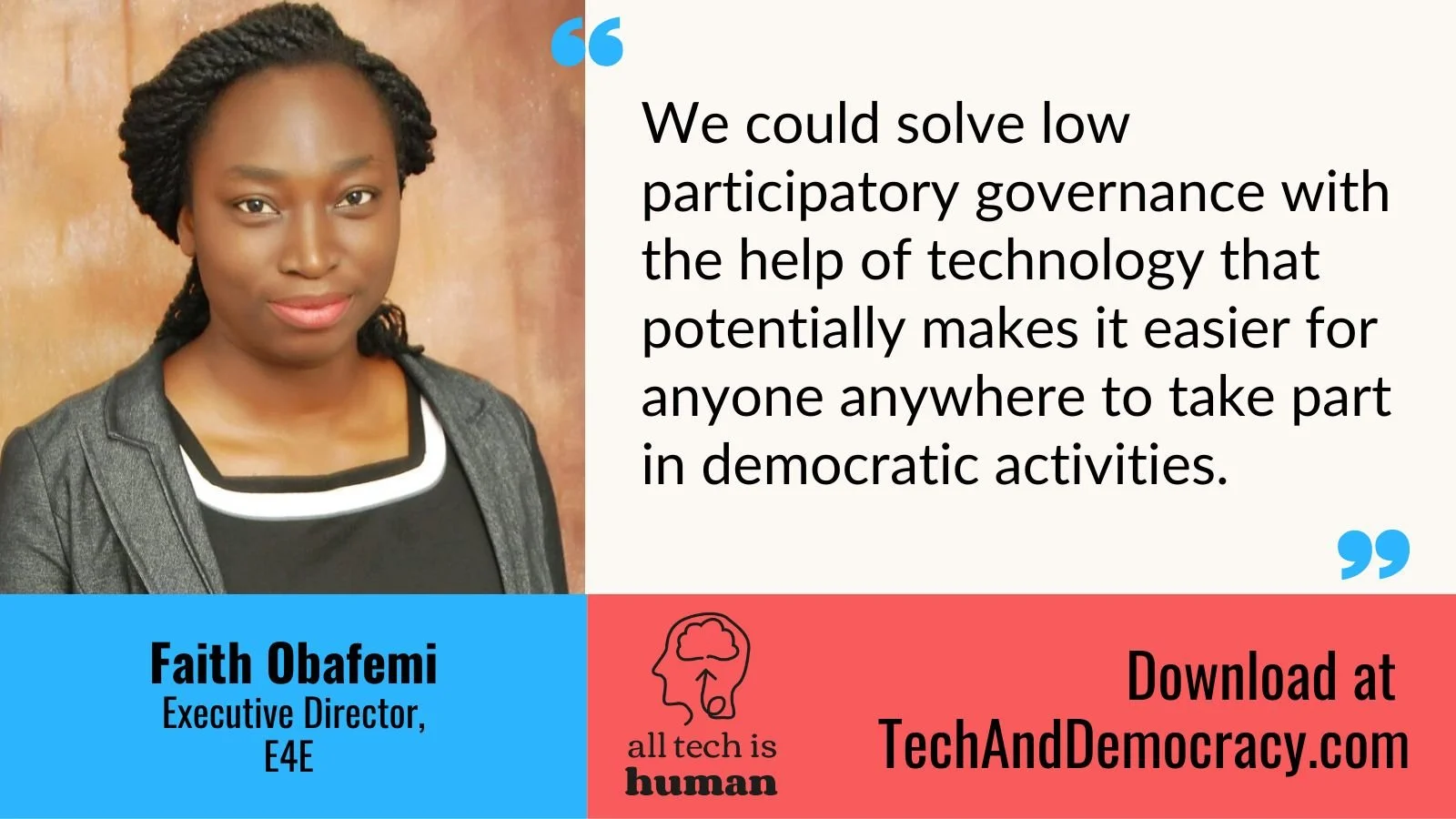Tech and Democracy Profile: Faith Obafemi
All Tech Is Human’s Tech & Democracy report addresses key issues and best practices in the field, and highlights a diverse range of individuals working in the field (across civil society, government, industry, academia, and entrepreneurship). Similar to all of our reports, this is assembled by a large global working groups across multiple disciplines, backgrounds, and perspectives.
As part of the Tech & Democracy report our team interviewed more than 40 people working to create a brighter tech future. This week, we’ll be highlighting select interviews.
Today, we hear from E4E Executive Director Faith Obafemi. To read more profile interviews, click below to download the Tech & Democracy report now.
Q: Tell us about your role and what it entails.
In my current role at E4E, I strategize and implement activities we can carry out to realize our vision of enlightening, educating and engaging stakeholders on tech policy. Stakeholders range from individuals, to companies to organizations, to government agencies and government officials.
Q: How did you build your career in the tech & democracy field? What advice would you give others looking for a similar career?
When I look back in hindsight, I realize that I have built my career by simply doing three things, which I like to call the 3C framework: Consume, Create, and Collaborate.
When I was just starting out, my first line of action was to consume as much content as I could about tech policy, from articles to videos and even podcasts. The consequent action of consuming is to create. As you consume more content, you begin to identify gaps and ignite a burning desire to fill those gaps with your own content. Creating forces you to ruminate on all that consumption and check if it has properly digested. Sorry about all the food analogies, I am a foodie! Creating also solidifies your knowledge. After weeks and months of consuming and creating, you will naturally begin receiving collaboration requests. Collaboration helps to broaden your reach, letting more people know about you and what you do.
These are the exact things I did to grow my career. It is the advice I would give to anyone interested in a similar career. In fact, this works for any career. I would like to add that this is not a start-and-finish framework, rather it is to be recurring. You keep consuming to stay up to date. You keep creating to stay top of mind and you keep collaborating for more growth.
Q: How is democracy defined in your line of work? How does it influence your approach to technology and democracy?
Democracy is defined as a non-authoritarian rule where the masses appoint a representative to decide on their behalf. Referencing this definition provides a yardstick for spotting tech policies and use cases that go against democratic concepts. Ironically, as I have seen in my line of work, the masses are not often carried along in tech policy activities, even in official democratic societies. While in official non-democratic societies, authoritarian practices of the government also extend to the adoption and application of technology.
Q: What do you think are the key issues at the intersection of technology and democracy?
Generally, technology enables or amplifies. In this case, if it is a truly democratic society, technology will enable more democratic activities and also amplify the state of things. The same is true for so-called backsliding democratic societies as seen with the internet shutdowns, network throttling, and mass surveillance.
Some of the key issues at the intersection of technology and democracy are weak enforcement of tech laws and policies as well as a lack of clarity with the application of existing and new laws.
Q: What are the key challenges for democracy that technology can ameliorate?
We could solve low participatory governance with the help of technology that potentially makes it easier for anyone anywhere to take part in democratic activities. Taiwan’s digital minister has leveraged technology to get youths active in digital governance activities.
Bureaucracy and slow action to address issues relating to governance. These days, tech has made it easy to chat with a government representative online, giving a chance to air complaints. Getting an appointment to meet the same representative offline would probably be a herculean task.
Q: What actions can government institutions and/or media companies take to rebuild trust with civil society?
Opening up opaque processes or sections in their outputs. For example, media houses can be more transparent with their funding sources, their source of information, and how they verify their content. Government institutions can also incorporate transparency practices that give more clarity on how they raise funding, what they spend those funds on, and how they decide on what to fund. There should be active feedback loops that receive actual attention and not just fall into the usual formality black-hole.
Q: Which people, organizations, or institutions are doing impactful work at the intersection of technology and democracy?
Kelechi Achionu, Buki Ogunsakin, Rebecca Asseh, Malan Moses, Advocacy for Policy and Innovation (API)


